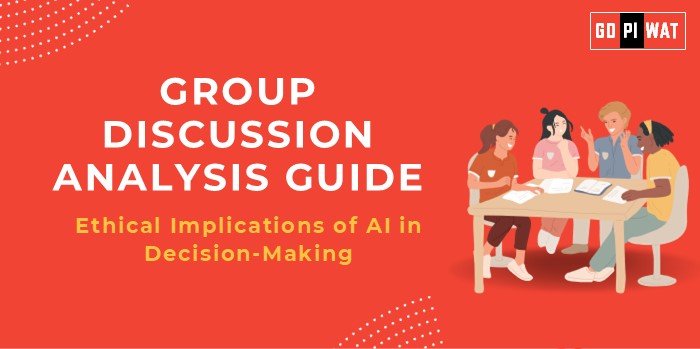📋 Group Discussion (GD) Analysis Guide: Ethical Implications of AI in Decision-Making
🌐 Introduction to the Topic
- 🔍 Opening Context: Artificial Intelligence (AI) is rapidly transforming decision-making processes across industries, from healthcare and finance to law enforcement and governance. While AI offers unparalleled efficiency and data-driven insights, its ethical implications raise questions about fairness, accountability, and societal trust.
- 📖 Topic Background: The integration of AI in decision-making began with advancements in machine learning and big data analytics. Algorithms now power credit scoring systems, predictive policing, and even hiring decisions. However, recent controversies, such as bias in facial recognition or discriminatory loan approvals, underscore the pressing need for ethical frameworks.
📊 Quick Facts and Key Statistics
– 🌍 Global AI Spending: $154 billion in 2023 (highlighting rapid adoption globally).
– ⚖️ Bias in AI Models: 78% of AI practitioners reported concerns about algorithmic fairness (IBM AI Ethics Survey, 2023).
– 💼 AI in Hiring: 67% of large companies use AI to screen candidates (LinkedIn Workforce Report, 2023).
– 🚨 Ethical Violations: 40% of AI systems audited showed potential biases (Stanford AI Index, 2024).
– ⚖️ Bias in AI Models: 78% of AI practitioners reported concerns about algorithmic fairness (IBM AI Ethics Survey, 2023).
– 💼 AI in Hiring: 67% of large companies use AI to screen candidates (LinkedIn Workforce Report, 2023).
– 🚨 Ethical Violations: 40% of AI systems audited showed potential biases (Stanford AI Index, 2024).
🤝 Stakeholders and Their Roles
- 🏛️ Governments: Regulation and ethical oversight.
- 🏢 Corporations: Development and deployment of AI systems.
- 🎓 Academia: Research on AI ethics and unbiased algorithms.
- 📢 Civil Society: Advocacy for transparency and accountability.
- 👥 End Users: Awareness and demand for fair AI systems.
🏆 Achievements and Challenges
✨ Achievements:
- ⚡ Increased Efficiency: AI reduces decision-making time in sectors like finance and supply chain management.
- 🔮 Enhanced Predictive Power: Applications in healthcare, such as predicting disease outbreaks.
- 📚 Fair Access Potential: Properly trained AI can democratize access to services like education.
⚠️ Challenges:
- 🤔 Algorithmic Bias: High-profile cases like biased sentencing software in the US.
- 🔐 Transparency Issues: Black-box algorithms limit understanding and accountability.
- ⚖️ Ethical Framework Gaps: Lack of universal standards for AI ethics.
🌍 Global Comparisons:
– Successful Example: Canada’s Algorithmic Impact Assessment framework promotes ethical AI use.
– Controversial Example: China’s use of AI for surveillance raises privacy concerns.
📌 Case Studies:
– COMPAS System: Highlighted bias in criminal risk assessment.
– Amazon’s AI Hiring Tool: Discontinued for favoring male candidates.
🧠 Structured Arguments for Discussion
- ✅ Supporting Stance: “AI enhances efficiency and reduces human error, especially in data-intensive fields like medicine and finance.”
- ❌ Opposing Stance: “Algorithmic biases perpetuate systemic discrimination, undermining trust in AI-based decisions.”
- ⚖️ Balanced Perspective: “While AI offers transformative benefits, ethical concerns must be addressed through regulation and transparency.”
🎯 Effective Discussion Approaches
- 📜 Opening Approaches:
- 💡 “AI can now predict cancer earlier than doctors, but at what ethical cost when such tools are inaccessible to underprivileged regions?”
- 📌 “The COMPAS case exemplifies how biases in AI can exacerbate societal inequities.”
- 🔍 Counter-Argument Handling:
- “While biases exist, they reflect societal inequities. Proper training and diverse datasets can mitigate such issues.”
- “Transparency laws, like the EU’s AI Act, are crucial for ethical AI deployment.”
🔍 Strategic Analysis of Strengths and Weaknesses
- 💪 Strengths: Efficiency, scalability, potential for fairness.
- ⚠️ Weaknesses: Bias, lack of accountability, ethical gray areas.
- 🚀 Opportunities: Ethical frameworks, global collaborations, better data.
- ⚡ Threats: Privacy violations, misuse, public distrust.
🎓 Connecting with B-School Applications
- 🌟 Real-World Applications: AI ethics in business decisions; case studies in governance.
- ❓ Sample Interview Questions:
- “How can businesses ensure AI systems remain unbiased?”
- “Discuss the ethical trade-offs in using AI for profit maximization.”
- 💡 Insights for B-School Students:
- Understanding AI’s role in leadership decisions.
- Potential to lead ethical AI initiatives in organizations.


